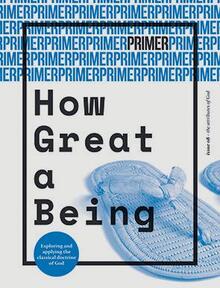Certainly not primitive
I love Primer. Not simply because it man-ages to be thought-provoking, theologically reliable and relevant, but also because it’s so useful in lots of different ministry settings.
Steve Palframan, Pastor of Aigburth Community Church, Liverpool, which is a part of the FIEC

PRIMER ISSUE #8 HOW GREAT A BEING
Exploring and applying the classical doctrine
of God
By various authors
FIEC, 80 pages, £6.99
ISBN 978 1 784 984 656
I’ve read this edition with a second-year university student who’s just starting to think seriously about theology. Our church staff team have read an article aloud together and discussed it. Although they don’t know it yet, the church elders are going to be the next group to encounter its content!
In this edition, the first of two planned on the doctrine of God, Samuel Bostock, Gerald Bray, Matt Lillicrap, Graham Shearer, Christopher Stead and Nick Tucker take us through some of the attributes of God associated with classical theism.
Healthy diet
The journal opens with an excellent introduction to the importance of holding a thoughtful doctrine of God. Challenging the premise that expository ministry alone is a sufficient diet for the Christian life, Graham Shearer convincingly demonstrates that accommodation, anthropomorphisms and analogy in Scripture preserve our grasp of the ‘transcendent, unchanging, infinity of Father, Son and Spirit.’
Unchangeable
The highlight for me, though, was Christopher Stead’s article on the doctrine of divine impassibility. Thoughtfully and carefully structured, the article anticipates questions and objections well as it makes the case that God cannot suffer or undergo emotional change. This is clearly an area of contemporary confusion and the article navigates that well, before ending with the pastoral importance of understanding the unchanging impassibility of the God who is also with us in our emotional chaos.
In conclusion a word should also be said about the design and format of Primer.
Wide margins, thick paper and questions for discussion invite the reader to scribble notes and comments on the way through. Primer is also beautifully designed making it an attractive journal to pick up by those who might otherwise be turned off by an academic-looking production. At times this can be slightly overdone and the layouts in places do detract from the content rather than adding to it, but none of that changes my love for Primer, and I’m eagerly looking forward to the next edition.


